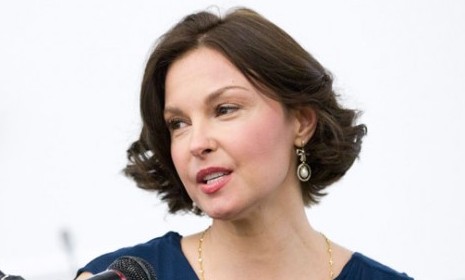Ashley Judd's crusade against the 'sexist' media
Fed up with tabloids claiming that her "puffy face" is evidence of plastic surgery, the actress pens an editorial for The Daily Beast calling for an end to objectification

A free daily email with the biggest news stories of the day – and the best features from TheWeek.com
You are now subscribed
Your newsletter sign-up was successful
Actress Ashley Judd (Heat, Double Jeopardy) is winning raves for her "blistering" response to recent criticisms of her physical appearance. Last month, photos of Judd's so-called "puffy face" triggered rumors that she'd undergone plastic surgery. The ensuing media frenzy inspired Judd, who currently stars in ABC's Missing, to pen an editorial for The Daily Beast addressing what Jezebel's Lindy West has dubbed "Judd-puff-mageddon 2012." Judd calls out the "sexist" news outlets who perpetuate "the assault on our body image, the hypersexualization of girls and women... and the general incessant objectification" of the female body. Here, a guide to the controversy, Judd's response, and whether anything will change:
How did this start?
While on a promotional tour for her new ABC drama Missing, Judd looked a little "puffy" in the face, according to some observers. "The media went right for the needles and knives," says Denise Restauri at Forbes of the plastic-surgery speculations. Us Weekly called her "nearly unrecognizable," while The Stir said she appeared "way chubbier than usual." Judd's rep clarified that the actress was treating a bad sinus infection with steroids — which can have a bloating effect — but that didn't quell the "bodysnarking."
The Week
Escape your echo chamber. Get the facts behind the news, plus analysis from multiple perspectives.

Sign up for The Week's Free Newsletters
From our morning news briefing to a weekly Good News Newsletter, get the best of The Week delivered directly to your inbox.
From our morning news briefing to a weekly Good News Newsletter, get the best of The Week delivered directly to your inbox.
What does Judd's editorial say?
Judd begins by saying that, while she usually refuses to read what's written about her, let alone weigh in, she felt she had no choice in this case. "The conversation was pointedly nasty, gendered, and misogynistic and embodies what all girls and women in our culture... endure every day, in ways both outrageous and subtle." She goes on to quote, without attributing sources, five recent criticisms of her appearance. "Who makes the fantastic leap from being sick... [to] plastic surgery?" she asks, concluding that "the insanity has to stop."
How are people reacting to her piece?
It's a "brave, biting, intelligent response" to a problem that has gotten out of control, says Donna Kaufman at iVillage. Moreover, a celebrity wrote it, says Julie Zeilinger, editor of feminist blog FBomb.org. Actresses are at the center of the troubling problem in which women are valued "only as much as their worst flaw, and Judd rightly asserted "that what the media is doing to her — and therefore, all women — is beyond being not okay." Most daring is how Judd calls out news outlets for which she has done "serious work," says Hadley Freeman at the U.K.'s Guardian — likely a reference to The Huffington Post, which once published a Judd-penned op-ed about preventing HIV.
A free daily email with the biggest news stories of the day – and the best features from TheWeek.com
Is everyone praising Judd?
No. While Judd makes important points about the harmful scrutiny women endure in our society, her piece "is not without its flaws," says Mary Elizabeth Williams at Salon. "She manages to come off as impossibly pleased with herself," as she counteracts the media's criticism by bragging about her "flawless skin," and name-dropping her various charitable causes.
Will the piece change anything?
"Maybe it will shame The Huffington Post into realizing that publishing serious news does not justify the screeds of celebrity gossip that contaminate the website," says Freeman, though that is probably wishful thinking. True, says Williams. One editorial won't keep tabloids from "their daily digging." But it certainly has me re-evaluating my practices, says West. "I'd rather sacrifice a few good jokes" than "contribute any more to the commodification and dehumanization of women."
Sources: Daily Beast, Forbes, Guardian, iVillage, Jezebel, Radar, Salon, Stir, Us Weekly
-
 The ‘ravenous’ demand for Cornish minerals
The ‘ravenous’ demand for Cornish mineralsUnder the Radar Growing need for critical minerals to power tech has intensified ‘appetite’ for lithium, which could be a ‘huge boon’ for local economy
-
 Why are election experts taking Trump’s midterm threats seriously?
Why are election experts taking Trump’s midterm threats seriously?IN THE SPOTLIGHT As the president muses about polling place deployments and a centralized electoral system aimed at one-party control, lawmakers are taking this administration at its word
-
 ‘Restaurateurs have become millionaires’
‘Restaurateurs have become millionaires’Instant Opinion Opinion, comment and editorials of the day